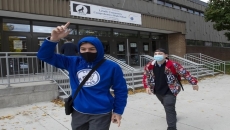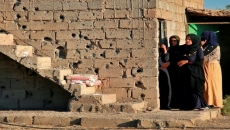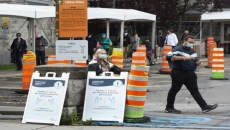Canada's national annual inflation rate was 0.5 per cent in September, Statistics Canada says.
Canada's headline inflation measure went up in September by 0.5 per cent compared with a year ago, a better-than-expected increase, but one that experts say won't sway the Bank of Canada's stimulus measures.
Economists had, on average, expected a year-over-year increase of 0.4 per cent, according to financial data firm Refinitiv, following readings of 0.1 per cent increases in August and July.
The consumer price index for food was up 1.6 per cent last month, a slight slowing from the 1.8 per cent bump recorded in August. Passenger vehicle prices were up 2.7 per cent, and housing up 2.6 per cent.
Higher tuition fees, particularly in Alberta where a freeze was lifted, helped boost the reading.
But underneath the headline figure were signs of ongoing weakness in the Canadian economy.
Back-to-school shopping season wasn't as big as a year ago, noted by a drop of 4.1 per cent in clothing and footwear prices.
Air transportation prices fell by 3.2 per cent in September compared to a 16 per cent drop in August, bucking the traditional fall trend of sharp declines as demand weakens after the summer travel season that this year was largely grounded by COVID-19. With so few flights during the summer, September's decline is less pronounced
Gasoline prices were down 10.7 per cent from a year earlier. The agency said the consumer price index would have increased by one per cent in September had the price of gasoline not been factored in.
The soft inflation figures are the backdrop for stimulus the Bank of Canada has rolled out since the start of the pandemic, slashing its key policy rate to 0.25 per cent and snapping up government debt at an unprecedented rate.
In September, the average of Canada’s three measures for core inflation, which are considered better gauges of underlying price pressures and closely tracked by the Bank of Canada, was about 1.7 per cent.
The central bank will update its economic and inflation outlook next week, but has said it won't raise its key rate from near-zero until inflation is back at its two-per-cent target.
The bank's quarterly business outlook survey, released Monday, suggested companies expect inflation to remain below two per cent for the next two years. The companion survey of consumers found respondents' inflation expectations for the next year had declined.
The bank's hope is that by keeping its key rate low, it will drive down rates on mortgages and loans to make it easier for people to borrow and spend to aid the overall economy.
Its quantitative easing efforts, which is a way for central banks to push money into the economy to encourage lending and investment, will shift next week when the bank winds down three smaller programs over reduced demand and better market conditions.
The bank's first foray in quantitative easing does not come without potential perils, such as asset price bubbles and market distortions, which were noted in a September 2019 presentation to top federal officials trying to chart a path through economic uncertainty at the time.
"More extensive use of unconventional monetary policy is possible, but side-effects still relatively unknown," reads one note, citing asset price bubbles, or market distortions.
The Canadian Press obtained a copy of the documents through the Access to Information Act.
The risk is that lower rates prod governments and consumers to take on more debt, making households in particular more vulnerable to volatile interest rates in the future, said TD senior economist James Marple.
"Those concerns are obviously dwarfed by the near and present danger of having an economy slip even further into depression," he said in an interview.
"The need is to support growth and reduce unemployment so that it doesn't . . . have scarring effects that will really prolong the economic shock. But, the point remains that there may be some negative ramifications down the road."
The agency also released rates for major cities, but cautioned that figures may have fluctuated widely because they are based on small statistical samples (previous month in brackets):
— St. John's, N.L.: 0.7 per cent (-0.4)
— Charlottetown-Summerside: 0.1 per cent (-0.3)
— Halifax: -0.5 per cent (-0.4)
— Saint John, N.B.: 0.1 per cent (-0.3)
— Quebec City: 0.5 per cent (0.6)
— Montreal: 0.2 per cent (0.4)
— Ottawa: 1.2 per cent (0.9)
— Toronto: 0.2 per cent (-0.4)
— Thunder Bay, Ont.: 0.5 per cent (-0.5)
— Winnipeg: 0.3 per cent (0.0)
— Regina: 0.9 per cent (0.5)
— Saskatoon: 1.0 per cent (0.6)
— Edmonton: 1.2 per cent (0.6)
— Calgary: 1.4 per cent (0.6)
— Vancouver: 0.1 per cent (-0.2)
— Victoria: 1.1 per cent (0.1)
— Whitehorse: 0.3 per cent (-0.9)
— Yellowknife: -0.8 per cent (-1.3)
— Iqaluit: -0.7 per cent (-2.3)






